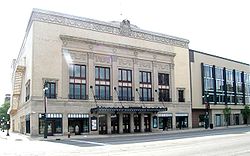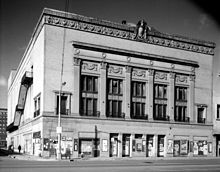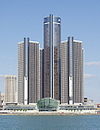- Orchestra Hall (Detroit, Michigan)
-
Orchestra Hall
 Orchestra Hall and Max M. Fisher Music Center
Orchestra Hall and Max M. Fisher Music CenterLocation: Detroit, Michigan
 United States
United StatesCoordinates: 42°20′55.49″N 83°3′33.48″W / 42.3487472°N 83.0593°WCoordinates: 42°20′55.49″N 83°3′33.48″W / 42.3487472°N 83.0593°W Built: 1919 Architect: C. Howard Crane Architectural style: Renaissance, other Governing body: Private NRHP Reference#: 71000429[1] Added to NRHP: April 16, 1971 Orchestra Hall is a concert hall located at 3711 Woodward Avenue in midtown Detroit, Michigan. The hall is renowned for its superior acoustic properties and serves as the home of the internationally known Detroit Symphony Orchestra (DSO), the fourth oldest orchestra in the United States.[2] With the creation of an adjoining auditorium for jazz and chamber music in 2003, Orchestra Hall became part of the Max M. Fisher Music Center. It was listed on the National Register of Historic Places in 1971.[1]
Contents
History
The Detroit Symphony Orchestra had previously played at the old Detroit Opera House. However, Ossip Gabrilowitsch demanded that the DSO build a suitable auditorium before he assumed his position as music director. Construction on Orchestra Hall began on June 6, 1919, and was completed in barely five months.
The 2014-seat hall was designed by the noted theater architect, C. Howard Crane. The first concert took place on October 23, 1919 and the hall remained the home of the Detroit Symphony Orchestra until 1939. Due to the financial difficulties of the Great Depression, the orchestra was compelled to leave Orchestra Hall and enter into a more economical arrangement to share the Masonic Temple Theatre. Orchestra Hall sat vacant until it was purchased by new owners. It reopened as the Paradise Theater on Christmas Eve 1941, and became a major jazz venue, hosting renowned jazz musicians such as Ella Fitzgerald, Billie Holiday, Count Basie, and Duke Ellington.
The Paradise closed in 1951. The building was abandoned for many years and eventually scheduled for demolition. Assistant Principal DSO bassoonist Paul Ganson spearheaded a movement to rediscover Orchestra Hall and raise funds to restore it. An early goal was attained in 1971 when the hall was added to the National Register of Historic Places.
Renovation work started in 1970 and continued for about two decades, costing roughly $6.8 million. The long deteriorating building required extensive renovations including: a new stage, all new seating, plaster and lath work, and restoration of historical decorations. All of the restoration work was completed with the goal of maintaining the fine acoustic properties that the hall was historically known for. The DSO moved back into Orchestra Hall in 1989.
Additional work on the hall was done in the summer months of 2002 and 2003 as part of the creation of the new Max M Fisher Music Center, or "MAX", as it is known. The work included renovations to the original facility as well as an expansion which houses additional lobbies and reception areas, dressing rooms and storage facilities, rehearsal space and a 450-seat venue for more intimate performances.
The mayor of Detroit delivers the annual State of the City address at Orchestra Hall.
See also
Notes
- ^ a b "National Register Information System". National Register of Historic Places. National Park Service. 2007-01-23. http://nrhp.focus.nps.gov/natreg/docs/All_Data.html.
- ^ The Detroit Symphony Orchestra' premieres on PRI
References and further reading
- Hauser, Michael and Marianne Weldon (2006). Downtown Detroit's Movie Palaces (Images of America). Arcadia Publishing. ISBN 0-7385-4102-8.
- Heiles, Ann Mischakoff (2007). America's Concertmasters (Detroit Monographs in Musicology). Harmonie Park. ISBN 0899901395.
- Hill, Eric J. and John Gallagher (2002). AIA Detroit: The American Institute of Architects Guide to Detroit Architecture. Wayne State University Press. ISBN 0-8143-3120-3.
- Meyer, Katherine Mattingly and Martin C.P. McElroy with Introduction by W. Hawkins Ferry, Hon A.I.A. (1980). Detroit Architecture A.I.A. Guide Revised Edition. Wayne State University Press. ISBN 0-8143-1651-4.
- Sharoff, Robert (2005). American City: Detroit Architecture. Wayne State University Press. ISBN 0-8143-3270-6.
External links
Theatre in Detroit Venues Baldwin Theatre • Bohemian National Home • Bonstelle Theatre • Century Theatre • City Theatre • Detroit Film Theatre • Detroit Masonic Temple • Detroit Opera House • Detroit Repertory Theatre • Fisher Theatre • The Fillmore Detroit • Fox Theatre • Gem Theatre • Greektown Casino • Harpos Concert Theatre • Hilberry Theatre • MGM Grand Detroit • Majestic Theater • Max M. Fisher Music Center • MotorCity Casino • Music Hall Center • Orchestra Hall • The Players • Redford Theatre • Senate Theatre • Studio Theatre
Organizations Bert's Entertainment • Detroit Institute of Arts • Detroit Repertory Theatre • Detroit Symphony Orchestra • Greektown Casino • Kresge Foundation • Live Nation • MGM Mirage • Mosiac Youth Theatre • MotorCity Casino • Nederlander • Plowshares Theatre Co. • Olympia Entertainment • The Players Club • Theatre Bizarre • Wayne State UniversityCity of Detroit Architecture · Culture · Detroit River · Economy · Freeways · Government · History · Historic places · International Riverfront · Media · Music · Neighborhoods · Parks and beaches · People · Skyscrapers · Sports · Theatre · Tourism · Transportation

U.S. National Register of Historic Places Topics Lists by states Alabama • Alaska • Arizona • Arkansas • California • Colorado • Connecticut • Delaware • Florida • Georgia • Hawaii • Idaho • Illinois • Indiana • Iowa • Kansas • Kentucky • Louisiana • Maine • Maryland • Massachusetts • Michigan • Minnesota • Mississippi • Missouri • Montana • Nebraska • Nevada • New Hampshire • New Jersey • New Mexico • New York • North Carolina • North Dakota • Ohio • Oklahoma • Oregon • Pennsylvania • Rhode Island • South Carolina • South Dakota • Tennessee • Texas • Utah • Vermont • Virginia • Washington • West Virginia • Wisconsin • WyomingLists by territories Lists by associated states Other Categories:- Concert halls in the United States
- Culture of Detroit, Michigan
- Buildings and structures in Detroit, Michigan
- Theatres in Detroit, Michigan
- National Register of Historic Places in Michigan
- Music venues in Michigan
- Performing arts centers in Michigan
- Event venues established in 1919
Wikimedia Foundation. 2010.


